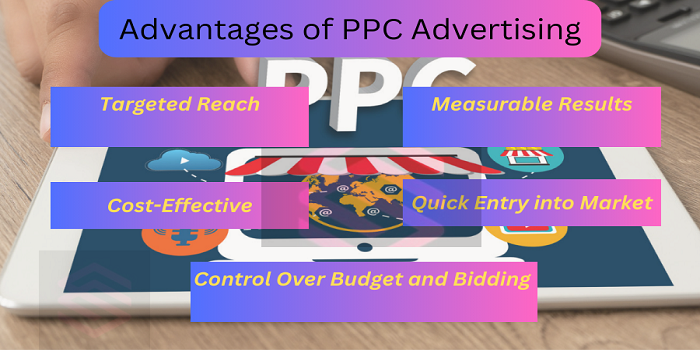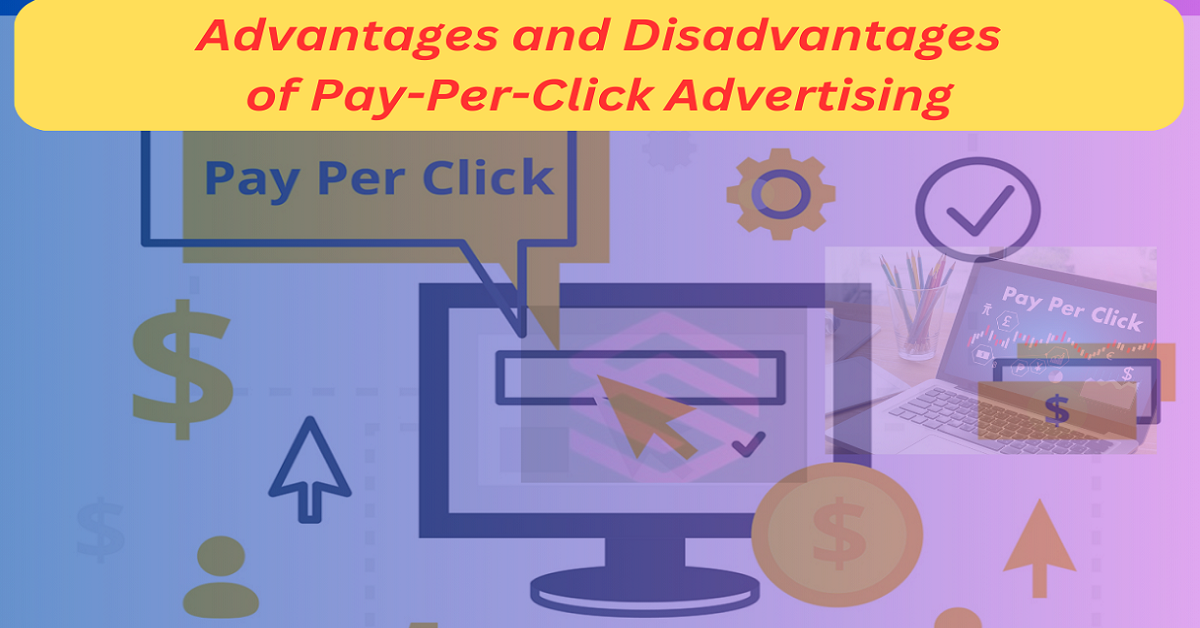Pay-per-click (PPC) advertising has become a cornerstone of digital marketing strategies for businesses of all sizes. It offers a direct and measurable way to reach target audiences, but like any marketing method, it comes with its set of advantages and disadvantages
Table of contents
Pay-Per-Click (PPC) Advertising
Advertisers pay a fee each time their ad is clicked in PPC advertising. Search engine advertising commonly associates ads with keywords, appearing at the top or bottom of SERPs.
Here’s a breakdown of how PPC advertising works:
- Keyword Selection: Advertisers choose relevant keywords that trigger their ads to appear when users search using those keywords. For example, a shoe store might choose keywords like “running shoes” or “sneakers.”
- Ad Auction: When a user searches using one of the chosen keywords, an ad auction takes place. In this auction, advertisers bid on how much they’re willing to pay for each click on their ad.
- Ad Placement: The search engine uses a combination of bid amount, ad quality, and other factors (like ad extensions and relevance) to determine the ad’s placement on the SERP. Higher bids and better ad quality often result in higher ad placements.
- Ad Display: If the advertiser’s bid is competitive and their ad meets the search engine’s quality criteria, the search engine will prominently display it on the SERP when users search using the relevant keyword.
- Cost and Performance: Advertisers are charged only when a user clicks on their ad, hence the name “pay-per-click.” The cost per click (CPC) can vary based on factors like keyword competitiveness and ad quality. Advertisers can track performance metrics like click-through rate (CTR), conversion rate, and return on investment (ROI) to measure the effectiveness of their PPC campaigns.

Advantages of PPC Advertising
Targeted Reach
One of the key benefits of PPC advertising is its ability to target specific audiences based on keywords, demographics, location, and device. This precision targeting ensures that advertisers display ads to users who are more likely to be interested in the product or service.
Cost-Effective
PPC can be cost-effective because advertisers only pay when someone clicks on their ad. This implies that we directly tie budget allocation to actual engagement, making it easier to track ROI (Return on Investment).
Measurable Results
PPC platforms provide detailed analytics and reporting, allowing advertisers to track metrics such as clicks, impressions, conversions, and cost per acquisition (CPA). This data-driven approach enables continuous optimization for better performance.
Quick Entry into Market
PPC campaigns can quickly set up and start generating traffic and leads almost immediately, unlike traditional marketing methods that may take time to yield results. This agility is especially beneficial for new product launches or time-sensitive promotions.
Control Over Budget and Bidding
PPC platforms offer flexible budgeting options and bidding strategies. Advertisers can set daily or campaign budgets, adjust bids based on performance, and pause or resume campaigns as needed, giving them full control over spending.

Disadvantages of PPC Advertising
| Disadvantages | Description |
| Costly if Mismanaged | While PPC can be cost-effective, it can also be costly if not managed properly. Inefficient keyword selection, poor ad targeting, or bidding wars can lead to overspending without achieving desired results. |
| Requires Continuous Monitoring | PPC campaigns require ongoing monitoring and optimization to maintain effectiveness. Ad performance, keyword trends, competitor activity, and market changes must be regularly assessed to make informed adjustments. |
| Competitiveness | Popular keywords and competitive industries can drive up bidding costs and make it challenging for smaller businesses to compete effectively. Advertisers need to strategize and focus on niche targeting to overcome this challenge. |
| Click Fraud Risks | PPC ads are susceptible to click fraud, where clicks are generated artificially to deplete ad budgets or manipulate competition. Advertisers must implement measures to detect and prevent click fraud to ensure campaign integrity. |
| Limited Long-Term Benefits | While PPC can deliver immediate results, its impact may diminish once ad spend is paused. Unlike organic search or content marketing, which can generate sustained traffic over time, PPC’s benefits are more short-term oriented. |
Comparison with Other Advertising Methods
SEO vs. PPC
PPC offers instant visibility and control over ad placement, while SEO (Search Engine Optimization) focuses on organic rankings and long-term visibility. Both complement each other in a comprehensive digital marketing strategy.
Social Media Advertising vs. PPC
Social media advertising targets users based on interests and demographics within social platforms, whereas PPC targets based on search intent. The choice between the two depends on campaign objectives and audience behavior.
Best Practices for Successful PPC Campaigns
To maximize the benefits of PPC advertising, businesses should follow best practices such as:
- Keyword Research and Selection: Identify relevant keywords with high search volume and commercial intent.
- Compelling Ad Copywriting: Create engaging ad copy that highlights unique selling propositions (USPs) and encourages clicks.
- Landing Page Optimization: Ensure landing pages align with ad content and provide a clear path to conversion.
- A/B Testing: Experiment with different ad variations, landing pages, and targeting options to optimize performance.

Conclusion
PPC advertising offers distinct advantages in terms of targeted reach, measurability, and quick results. However, it also comes with challenges such as cost management, competition, and the risk of click fraud. By understanding these advantages and disadvantages and implementing best practices, businesses can leverage PPC effectively as part of their digital marketing strategy.
Read More Advantages and Disadvantages of Pay-Per-Click Advertising
FAQs
PPC can benefit businesses of various sizes and industries, but it requires careful planning and management to ensure a positive ROI.
Set realistic budgets, regularly monitor performance, optimize keyword targeting, and control ad display times using ad scheduling.
Key metrics include click-through rate (CTR), conversion rate, cost per click (CPC), quality score, and return on ad spend (ROAS).
Yes, businesses can explore organic search (SEO), content marketing, social media advertising, influencer marketing, email marketing, and affiliate marketing as alternatives or complementary strategies.




